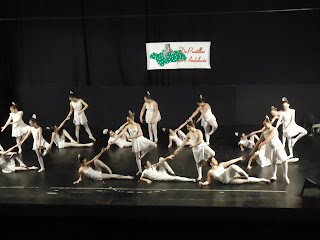By the time I get off the bus, metro to the hostel, and make my bed, it's time to power walk to the bear statue at Puerta del Sol and find Kevin: all of the tapas bars in Madrid await us. At 8.30pm, I already notice a few prostitutes out in the last few streets before I reach the square.
Kevin and I find each other without too much hassle, despite Sol being as crowded as ever, but we're not too sure where to head next. So, wandering aimlessly, we decide to opt for a culturally appropriate laid-back approach, and just see what we find.
- "It's got that dead vibe going. I like that", announces Kevin. So, our first stop is the long, thin, classic Spanish bar, with two elderly waiters in wasitcoats. The beers are a bit frothy, and our chorizo and potato is slammed down on the bar in front of us, but at 1€30 we are definitely not complaining!
- The next passable place is down the road: a retro-ish rock and roll bar. Inside it's dark, and the walls are covered in records. We're kept fairly well entertained by the music, which includes some good oldies like 'Locomotion.' It's a tad pricier than the last joint, though, at 8€ for two 'copas'- mixer drinks with a coke.
- A promoter in the street almost drags us into a dark, empty club, even though it's only about 9pm. Thankfully, there is sangria. Oh, and one dancey man and a couple who were pashing. We had to laugh when three girls came in; it's not often that such a small group completely throws the gender balance of a bar. 10€, an ADD Beatles medley and two sangrias later, the bland Spanish rock blaring gets too much for Kevin, and he announces: "We have to leave, now."
- Not yet having learned our lesson, we follow another promoter who entices us with promises of a playa (beach). We're not really sure if we've understood correctly. A beach, in a bar? She is, however, very insistent, so we follow her along to the bar. She even manages to hook in two more people, who slip in the door between her and us.
Our conversation goes something like this:
K: *steps in* I hate it.
L: Well, there's still time to leave.
K&L: *Glance over to promoter, who is heading downstairs, followed by the other two.
L: If we're going to run, we have to do it now, because she can't see us.
K: *Looks back again* Ok, GO!
K&L: *Leave very fast, without a backwards glance* - We decide that we are quite clearly doing it wrong, so opt for something more in the style of tapas bar #1. It looks like something from the 60s: tiles, and pictures of platos combinados (mixed plates- more or less meaning a meal with meat and some veg too) cover the walls, and theres one elderly couple down the back.
After downing a beer and some olives, we decide we like the place, and order'some bocadillos de tortilla (potato omelette sandwiches). Alas! It is not to be: the place is closing. - The Plaza Mayor is a must for every tourist and, since there are two of us, that makes a double imperative. One can't go past the calamari sandwiches there, and one can't have a calamari sandwich without a caña to wash it down.
All of this is done in rather green surroundings, with more well-dressed waiters, who are closing up for the night and putting everything into a dumbwaiter! - In aiming for La Latina, we stumble across a lone bar with patterned, tiled walls, and a dancing waiter. After a while, Kevin begins to suspect that the waiting staff are a couple, due to some "delicate touches on the shoulder."
I point out that the Spanish are a touchy-feeling bunch, and he acknowledges that he could be using his Scottish brain.
"It means nothing here. In Scotland, that means you're married!"
Were mightily amused when the dancing waiter asks everyone in the bar if they needed any refills, as he and the waitress are planning to hop outside for a smoke. Classic. Only in Spain could life be so relaxed as to allow the entire staff of a business (even if only two people in a small bar) to take their breaks at the same time.
Then it's back to my hostel, for 4 hours'sleep before meeting Sabrina at 7am the next morning...






















































